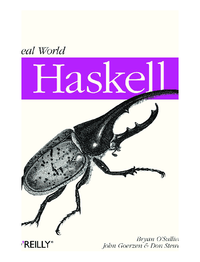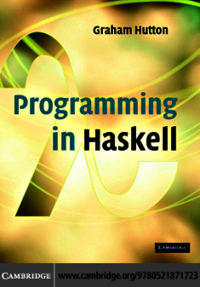Etiqueta "haskell"
Se han encontrado 4 Coincidencias
Real World Haskell
Programacion en Haskell
104 Visitas | 110 Descargas | 2014-03-03 15:22:57 | alvarojs
Haskell is a deep language; we think learning it is a hugely rewarding experience. We will focus on three elements as we explain why. The first is novelty: we invite you to think about programming from a different and valuable perspective. The second is power: we’ll show you how to create software that is short, fast, and safe. Lastly, we offer you a lot of enjoyment: the pleasure of applying beautiful programming techniques to solve real problems.

Programming in Haskell
Programación en Haskell
131 Visitas | 166 Descargas | 2014-03-03 15:25:13 | alvarojs
Haskell is one of the leading languages for teaching functional programming, enabling students to write simpler and cleaner code, and to learn how to structure and reason about programs. This introduction is ideal for beginners: it requires no previous programming experience and all concepts are explained from first principles with the aid of carefully chosen examples. Each chapter includes a series of exercises, ranging from the straightforward to extended projects, along with suggestions for further reading on more advanced topics. The presentation is clear and simple, and benefits from having been refined and class-tested over several years.

Yet Another Haskell Tutorial
Programacion en Haskell
83 Visitas | 75 Descargas | 2014-03-03 15:30:52 | alvarojs
The goal of the Yet Another Haskell Tutorial is to provide a complete intoduction to the Haskell programming language. It assumes no knowledge of the Haskell language or familiarity with functional programming in general. However, general familiarity with programming concepts (such as algorithms) will be helpful. This is not intended to be an introduction to programming in general; rather, to programming in Haskell. Sufficient familiarity with your operating system and a text editor is also necessary (this report only discusses installation on configuration on Windows and *Nix system; other operating systems may be supported – consult the documentation of your chosen compiler for more information on installing on other platforms).

The Haskell Road to Logic, Math and Programming
Programación en Haskell
96 Visitas | 93 Descargas | 2014-03-05 17:15:27 | alvarojs
The subject of this book is the use of logic in practice, more in particular the use of logic in reasoning about programming tasks. Logic is not taught here as a mathematical discipline per se, but as an aid in the understanding and construction of proofs, and as a tool for reasoning about formal objects like numbers, lists, trees, formulas, and so on. As we go along, we will introduce the concepts and tools that form the set-theoretic basis of mathematics, and demonstrate the role of these concepts and tools in implementations. These implementations can be thought of as representations of the mathematical concepts.
Contribuir
Usted puede contribuir con Libros UCLV, es importante para nosotros su aporte..
Contribuir